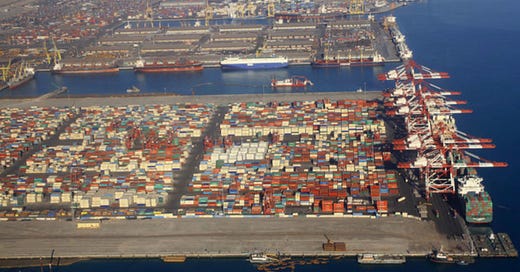NK hardens rhetoric against South; More luxury goods going from Russia to NK; Agreement on Chabahar Port; Iran vs. drug traffickers
Prohibited Transactions for the week of 15 Jan 2024 (#34)
North Korea
North Korean leader Kim Jong-un ratcheted up rhetoric against Seoul, now calling for the DPRK to define South Korea as “a foreign country and the most hostile state” and will be abolishing three agencies that worked on inter-Korean dialogue and cooperation.
A former high-ranking North Korean diplomat who is now a South Korean politician stated that Kim’s rhetoric is all a bluff.
North Korea’s foreign minister went to Russia on a three-day visit this week, meeting with her Russian counterpart for “comprehensive and substantial” talks, as well as meeting with Russian President Vladimir Putin to discuss “dynamic development” of the relationship between the two countries.
South Korean government officials noted a rise in luxury imports to the DPRK from Russia, particularly in 2023. Luxury items include high end vodka, watches and cosmetics being imported into North Korea.
According to US media, Russian use of North Korean short range ballistic missiles in Ukraine will likely result in Pyongyang being able to charge a premium for these systems when selling to other buyers.
In 2023, 196 North Koreans defectors arrive in South Korea, triple the number of people who defected in 2022. South Korean officials stated that approximately 10 of the defectors were high-ranking North Koreans, such as diplomats, trade officials and overseas students.
According to a new UN Office on Drugs and Crime (UNODC) report, they have seen indications that Mekong-based cyberfraud operators, drug traffickers, and North Korean hackers Lazarus Group are using the same regional money laundering and underground banking networks. //It’s not surprising that criminal actors operating in a geographic region would end up using the same illicit networks to move money. The more interesting question is who actually controls the regional money laundering networks and underground banks? Is it just money laundering-as-a-service, or is it controlled by one of the above listed illicit groups? Though many news outlets have been amplifying the Reuters article about this UNODC report, the mention of this overlapping illicit activity occurs only as a footnote on page 51, so there is not a lot of information available about Lazarus’ involvement. This entire report looks like a very good read for any compliance folks focusing on East and Southeast Asia.
Iran
Iranian media is reporting that Tehran and New Delhi reached a new long-term agreement on Chabahar Port, which is considered a key node of the International North-South Transport Corridor (INSTC). //As mentioned in Issues #9 and #11, Iran hoped that their ascension into the Shanghai Cooperation Organization (SCO) would hasten an agreement with member state India on the port. It’s unclear if that actually played a role in the agreement — of which there are scant details at the moment — coming together at this time. Chabahar has an exemption from US sanctions allowing for the “continued use of Chabahar and for imports through Chabahar for development of the Chabahar port and for development of a rail line from Chabahar to the Afghanistan border”
The US government designated two companies based respectively in Hong Kong and the United Arab Emirates (UAE) for working on behalf of an Islamic Revolutionary Guard Corps-Qods Force (IRGC-QF)-backed Ansar Allah (aka the Houthis) financial facilitator. The companies and four associated vessels raised funds from commodity sales that were used to support Ansar Allah.
The US State Department also designated Ansar Allah as a Specially Designated Global Terrorist group.
Iranian media reports that approximately 18 “criminal gangs” have been “destroyed” in the border areas of Sistan and Baluchestan province, which is in the southeast of the country, bordering Afghanistan and Pakistan. //Though Iranian media typically laments the economic and human costs of fighting drug trafficking in its border regions, the US also notes that corrupt elements of the IRGC “reportedly facilitate illicit drug smuggling or profit from the drug trade.” Drugs typically enter the country from the southeast and then are transported onward through Iran’s northern border to Turkey and Azerbaijan, or via the sea to eastern Africa.
Iran’s new ambassador to Pretoria said that Tehran is looking to establish direct flights and shipping lines to South Africa.
Trade between Iran and the European Union (EU) reached USD4 billion in the first 10 months of 2023, which is a 13 percent drop from the same time period in 2022.



